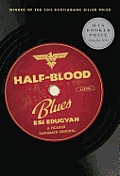Half-Blood Blues
Esi Edugyan
By
Pamela Purves
Published: Apr 04, 2012
Category:
Fiction
Guest Butler Pam Purves is a strategic marketing and communications consultant whose practice includes national and international clients in the public policy, health care, business and financial services sectors. In 2000, she started PLA Strategic, a strategic consulting practice specializing in qualitative research, strategic and tactical marketing and communications planning and project management. She is also a fine arts photographer who has exhibited her work in Toronto, Nevis and Nova Scotia.
Red-hot jazz and dark, cold horror — this is a Second World War story you’ve never heard before. “Half-Blood Blues” — a finalist for the Man Booker Prize — follows a group of jazz musicians, bonded by love for the music, separated by race, tormented by genius, tempted by Delilah and teased by a shot with Louis Armstrong who is in Berlin to play and record — a Berlin that, until now, has been a safe haven for jazz and black musicians.
But from an easy, swinging life in a successful band, Sid, Fritz, Chip and Ernst see their world disappear as jazz is declared decadent and banished from the clubs of Nazi Germany. Once they were sought after; now they are just sought. They are evil by virtue of jazz and race — everything they are is wrong, for it is 1939 and Europe is seized with the threat and, in some countries, the realities of Nazism.
Into this fraught world drops Hiero, “The Kid.” Discovered by Delilah, one of Louis Armstrong’s singers, he is as black as black can be, he’s a trumpet player and he’s a German. Three strikes against him.
The “gates” (musicians) are thrown increasingly closely together. In Berlin, they hide by day and go out at night. They drink rot to ease their fear. They try to record in a closed club. The shock of the kid’s talent sits uneasily with some. Every knock at the door and every heavy step is a signal to run. [To buy the paperback from Amazon, click here. For the Kindle edition, click here.]
We usually went all of nowhere in the daytime. Never without Delilah, never the same route twice, and not ever into Rue des Saussaies or Avenue Foch. But Hiero, he grown restless as the occupation deepened. He was a Mischling, a half-breed, but so dark no soul ever like to guess his mama a white Rheinlander. … And add to this the fact he didn’t have no identity papers right now – well, let’s just say wasn’t no cakewalk for him.
After a deadly brawl, the kid is saved and a “Boot” lies dead — and they’ve been recognized. Big, beefy, red-faced Fritz withdraws to a safe white band because he can. Aryan-appearing Paul is a Jew and is arrested in the street. Mulatto Delilah disappears. At the expense of everything he wants to be, Ernst persuades his hated industrialist father to get papers for the remaining band members. They barely get through the frontier and arrive in Paris the day war is declared.
The music, the war and forced confinement intensify emotions. These people love each other, are jealous and afraid for each other, are protective and selfish — and they betray each other.
The narrator of the story is Sid, a lovable, insecure, light skinned, straight haired and green eyed bass player. Chip, darker, is a joker and a gifted drummer. As for “The Kid,” he’s apparently a genius; he’s also secretive and sullen and cruel. They share a common focus on their music and on their main chance — Armstrong. When the recording begins, Armstrong sets Sid aside. The Kid is in. Chip is in. Only Sid is out. He is sick with jealousy.
No sooner do they start than “the Boots” arrive. Once again they are in hiding, waiting for nightfall, waiting for the call from Armstrong, waiting for papers that will help them get out, starving and drinking the rot. Then they hear that Armstrong has returned to the States. Their dreams are shattered. Sid’s jealousy dissolves. They’re equal again. It’s horribly human.
But the desperate desire to play isn’t over. The Kid is burning up to record a line he’s been thinking about. So is Sid. It will be their last act. It will be Sid’s last chance. In a derelict studio they make the music of their lives.
It was the sound of something growing a crust, some watery thing finally gelling. The very sound of age, of growing older, of adolescent rage being tempered by a man’s heart.
Sid plays like never before. He is finally an equal. But his equality has come at an awful price as the story later reveals.
It made even me sound solar. Hot in a simmering, otherworldly way. And all at once I understood what the kid was to me. That only playing with him was I pulled out of my own sound. Alone, I wasn’t nothing. Just a stiff line, just a regular keeper of the beat. But the kid, hell, his horn somehow push all that forward too, he shove me on up into the front sound with him. Like he was holding me in time.
This is a book to curl up with. But it’s not cozy; the characters are, by turns, awful, lovable and real. You both root for them and are shaken by them. You want them to be saved and celebrated in a better world. They are — but in nothing like the way you hoped for.
BONUS INTERVIEW
The Guardian interviewed Esi Edugyan about the book. Click here.


